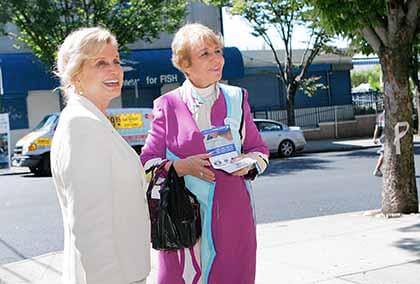By Nathan Duke
Manhattan attorney Reshma Saujani may have been U.S. Rep. Carolyn Maloney’s (D-Astoria) toughest opposition in years, but the longtime congresswoman handily defeated her challenger in last week’s Democratic primary because she has been visible in her district, political insiders said.
Maloney, who was first elected to Congress in 1992 and serves as the House’s chairwoman of the Joint Economic Committee, took 81 percent of the vote in the Sept. 14 primary. Saujani, a Manhattan lawyer who formerly worked on Wall Street, received 19 percent.
Maloney will now face Republican Ryan Brumberg in the Nov. 2 general election.
Queens political insiders said they have seen anti-incumbent sentiments toward congressional members across the United States. But they believed Maloney was able to fend off her primary opponent because the residents of her district did not appear to harbor those sentiments toward her.
“While there is certainly an anti-incumbent move, I don’t think it’s nearly powerful enough to unseat politicians who are on good terms with their district,” said Michael Krasner, a political science professor at Queens College and the co-director of the Taft Institute. “The general rule is that it’s hard to beat an incumbent unless there is a personal scandal or some kind of major tidal wave involving the party.”
Krasner said he believed the race possibly appeared to be closer because Saujani did not shy away from attacking the congresswoman.
“I think maybe that impression came about because [Saujani] was aggressive and articulate,” he said. “But it was hard to see Maloney losing, even though she had an intelligent and spirited opponent. She’s had a pretty high profile and has been very visible with medical services for 9/11 workers. She’s had a public stance on issues that have real emotional resonance in her district. I think all that stood her in good stead.”
Maloney said one of her goals would be to pass a health and compensation act for Ground Zero workers who were at the World Trade Center site following the Sept. 11, 2001, terrorist attacks.
State Assemblyman Michael Gianaris (D-Astoria) said he believed Saujani would have likely drawn more votes had she run in a different race.
“She was running at the right time in the wrong place,” he said. “In a year when voters want change, they are also intelligent enough to realize that Maloney is part of the solution, not the problem.”
The race between Maloney and Saujani often became acrimonious. Saujani’s campaign sent out fliers that accused the congresswoman of taking campaign funds from special interests as well as holding a fund-raiser with members of political action committees at an event where musicians James Taylor and Carole King played.
Maloney’s camp sent out a mailer that attempted to link Saujani to Hassan Nemazee, a former finance chairman for the Democratic Senatorial Campaign Committee who pleaded guilty in March to defrauding three banks out of loans totalling more than $200 million.
James Allen, a spokesman for Saujani’s campaign, said the Manhattan attorney was “definitely staying in public service,” but was not sure what office she would target next.
“I think she’s still looking at this election and what happened,” he said. “I’m sure she’ll be running for office again, but I wouldn’t say that she’s declaring that she’s running against Maloney in 2012. Reshma is proud of the way she was able to activate some of the communities that have been ignored for so long. Ultimately, it’s really, really tough to take on an 18-year incumbent with name recognition and twice as much money.”
Maloney’s district covers Astoria, Long Island City and Manhattan’s Upper East Side.
Reach reporter Nathan Duke by e-mail at nduke@cnglocal.com or by phone at 718-260-4566.



































